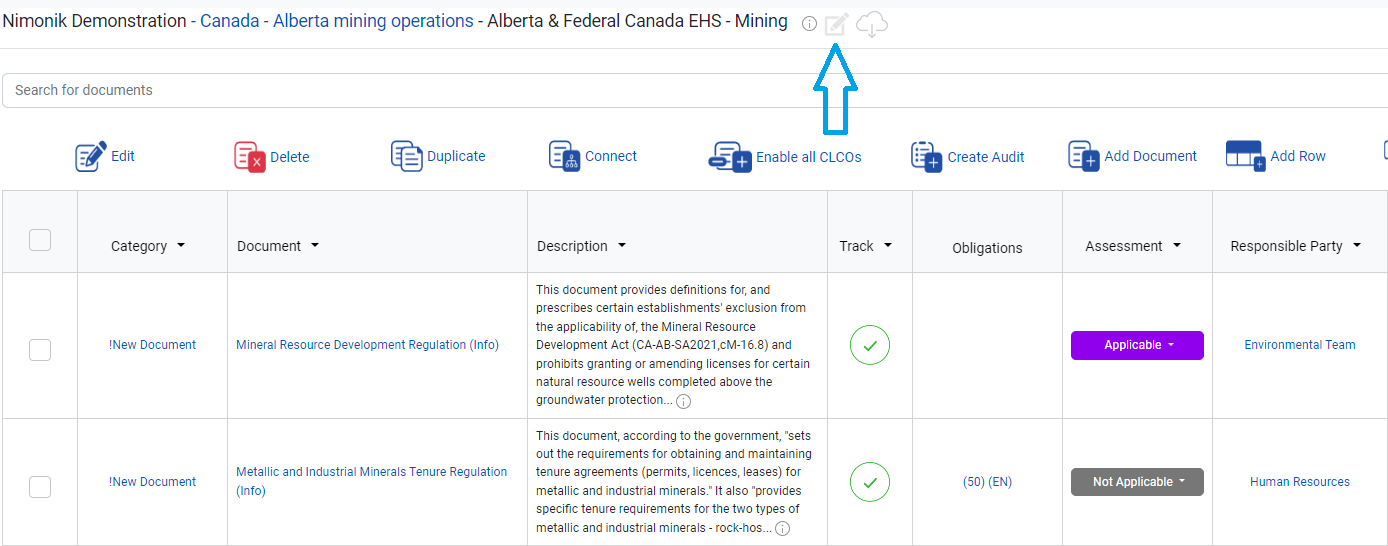When creating a Compliance Obligations Register, you have the option to set the Industrial Sectors, Jurisdictions, Document Status, Document Types, and Topics that are relevant to it. Your selection will determine the new documents that are proposed for your Compliance Obligations Register. Therefore, it is important to choose them carefully.
On the register’s page, you can access the settings of the register by clicking the edit icon pictured below

Select the Industrial Sectors, Jurisdictions, Document Status, Document Types, and Topics that are relevant to the register. New documents added to Nimonik’s library that fall within the filters you set will automatically be added into the register allowing you to stay aware of new potentially applicable documents.

You can select whether you want new documents to be added to your register automatically by using the setting pictured below.

On the same page, you can also determine whether you want to receive actions for a “Removed CLCO clause”

Please note that you will only see the Jurisdictions, Industrial Sectors, Document Types and Topics that your account is subscribed to.
Jurisdictions
Jurisdictions group documents by the legal jurisdiction that has published them and that enforces them. You should only select the jurisdictions that may regulate your activities at the location of the Facility or Facilities that are using the specific Compliance Obligations list.
Industrial Sectors
Industrial Sectors group documents by the areas of industry to which they are applicable. Nimonik determines Industrial Sectors based on the typical business activities that a company would engage in in the given Industrial Sector. Most are fairly straight forward (Agriculture, Mining, etc.), but there are two that you may or may not require in order to meet all of your compliance requirements.
Industrial sectors are exclusive, this means that documents in the Mining industry are only the documents that are specific to the Mining industry. The Mining industry will not include General Industry documents. Therefore, to obtain complete coverage for a Mining site, we recommend selecting General Industry + Mining. There are certain exceptions to this rule:
- General Industry – Documents that are common to many industries or sectors
- General Industry includes documents in Building Management and Maintenance
- Building Management and Maintenance includes the documents in Owned and Leased Office Spaces
- General Industry includes documents in Building Management and Maintenance
- Other – Documents that are not common to multiple industries or sectors, and are not described in our other specific sectors. (for example, documents for hair salons!)
Document Types
Document Type groups documents by their type. Depending on your subscription, this can include:
- Internal Documents you have uploaded
- Standards
- Notices
- Orders & Directives
- Laws
- General (Gov) Permits
- Guidance documents
See our dedicated “Document Types” help page for more details.
Document Status
Document Status groups documents by their state of application. Depending on your subscription, this can include Proposed, Published, In Force, and Repealed documents.
Please note that Proposed or temporary legislation becomes Archived when certain deadlines are met.
See our dedicated “Document Status” help page for more details.
Topics
Topics group documents by the subject matter to which they are applicable. Most are fairly straight forward (Air, Waste, etc.), but there are a few that you may or may not require in order to meet all of your compliance requirements.
- Equipment – 2,000 pieces of Industrial Equipment that are explicitly mentioned in documents.
- Environment Uncategorized – Documents that fall under the Environmental umbrella but may be further categorized at a later date.
- Occupational Health and Safety Uncategorized – Documents that fall under the Health and Safety umbrella but may be further categorized at a later date.
- Uncategorized – Documents have not yet been categorized.







